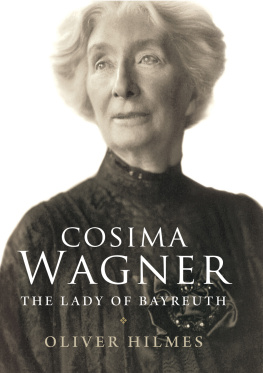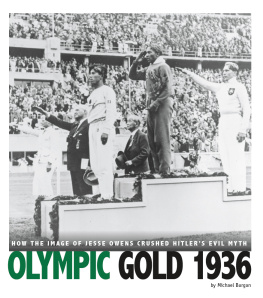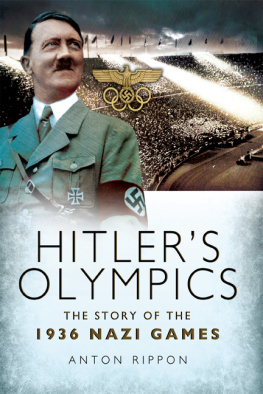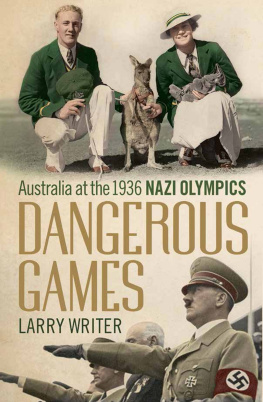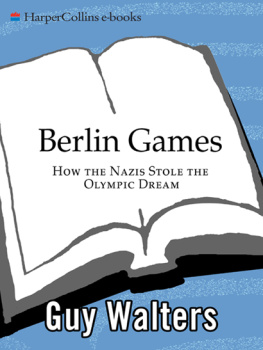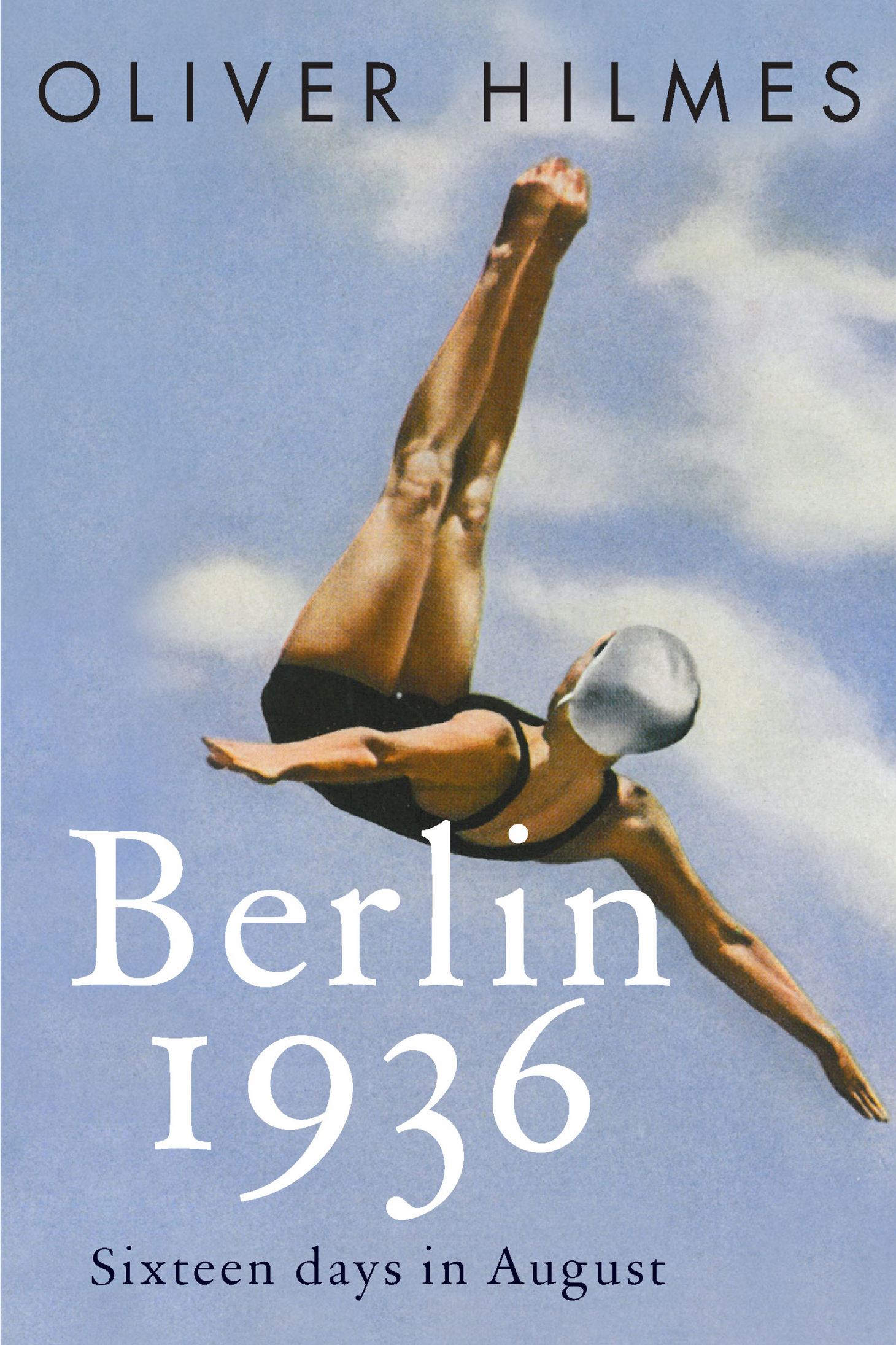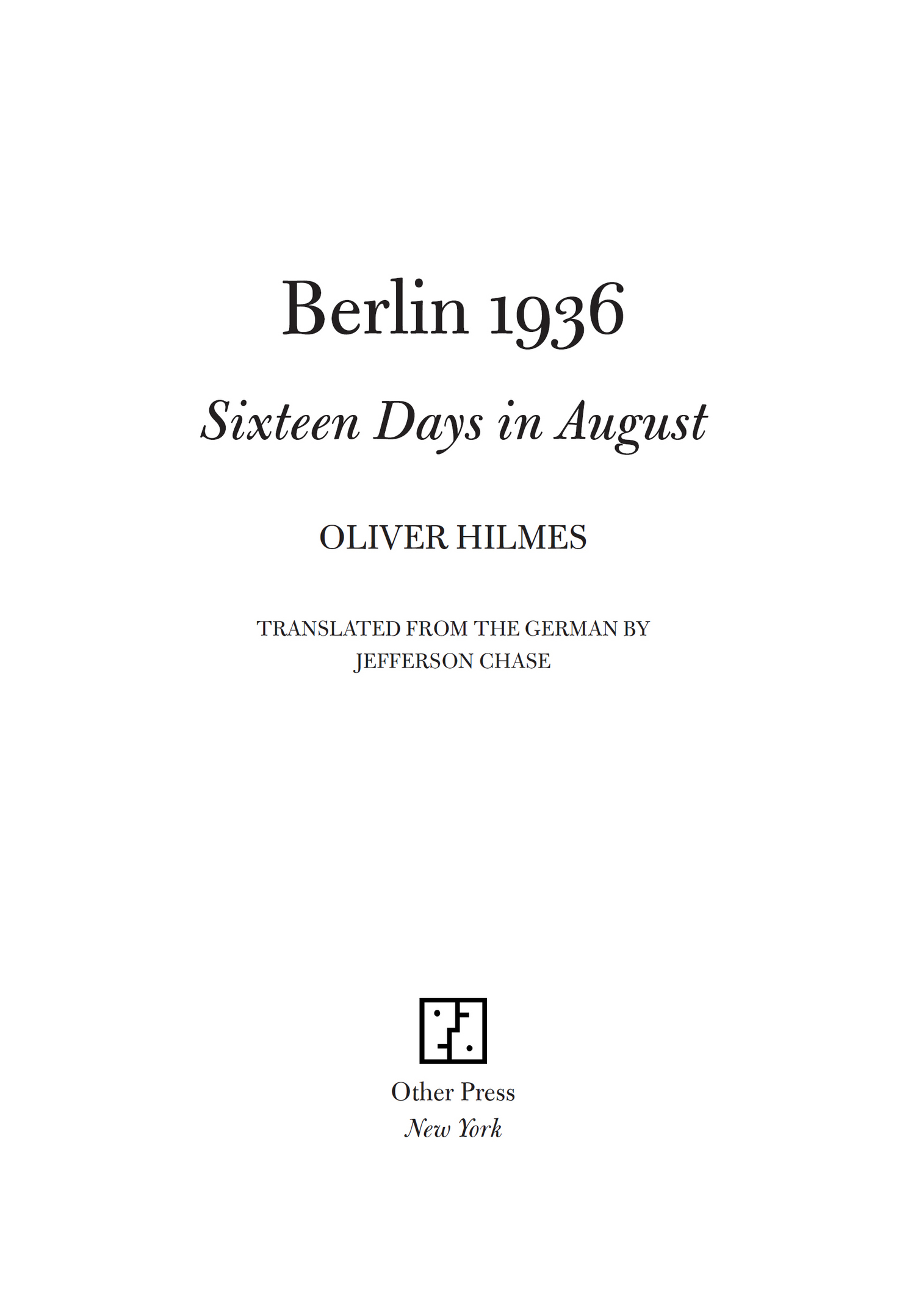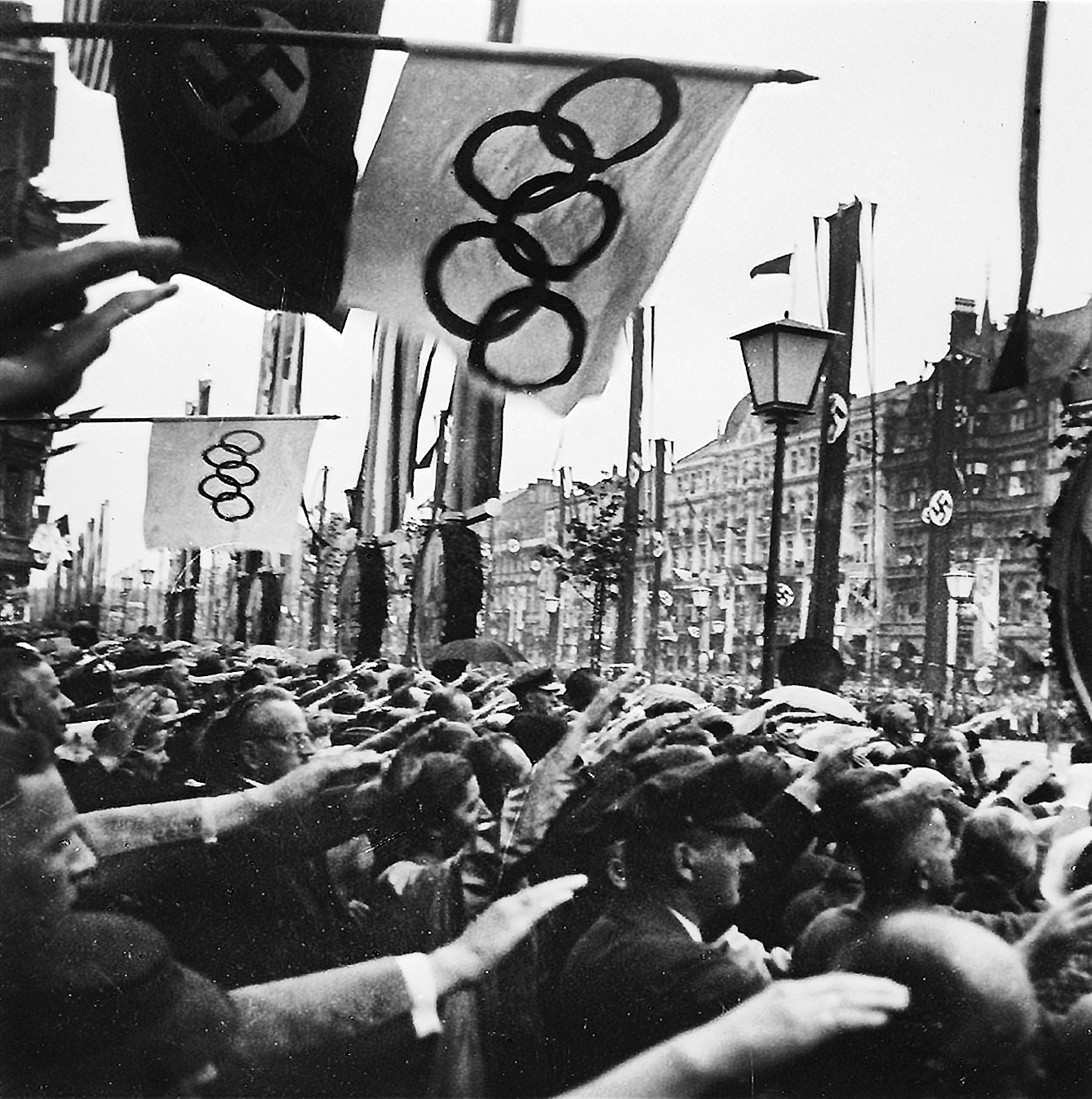Contents
Also by Oliver Hilmes
Franz Liszt: Musician, Celebrity, Superstar
Malevolent Muse: The Life of Alma Mahler
Cosima Wagner: The Lady of Bayreuth
Originally published in German as Berlin 1936: Sechzehn Tage im August
By Oliver Hilmes
Copyright 2016 Siedler Verlag, a division of Verlagsgruppe Random House GmbH, Mnchen, Germany
English-language translation copyright Jefferson Chase 2018
Published in the United Kingdom in 2018 by Bodley Head, an imprint of Vintage. Vintage is part of the Penguin Random House group of companies.
Production editor: Yvonne E. Crdenas
This book was set in India by Integra Software Services Pvt. Ltd, Pondicherry, India.
All rights reserved. No part of this publication may be reproduced or transmitted in any form or by any means, electronic or mechanical, including photocopying, recording, or by any information storage and retrieval system, without written permission from Other Press LLC, except in the case of brief quotations in reviews for inclusion in a magazine, newspaper, or broadcast. For information write to Other Press LLC, 267 Fifth Avenue, 6th Floor, New York, NY 10016. Or visit our Web site: www.otherpress.com
The Library of Congress has cataloged the printed edition as follows:
Names: Hilmes, Oliver, author. | Chase, Jefferson S., translator.
Title: Berlin 1936 : sixteen days in August / Oliver Hilmes; translated from the German by Jefferson Chase.
Other titles: Berlin 1936. English
Description: New York : Other Press, 2018.
Identifiers: LCCN 2017031868 | ISBN 9781590519295 (hardcover) | ISBN 9781590519301 (ebook)
Subjects: LCSH: Olympic Games (11th : 1936 : Berlin, Germany) | Berlin (Germany)History1918-1945. | OlympicsPolitical aspectsGermany. | National socialism and sports.
Classification: LCC GV722 1936 .H5413 2018 | DDC 796.48dc23
LC record available at https://lccn.loc.gov/2017031868
Ebook ISBN9781590519301
v5.2
a
For my family
Contents
Berlin in the summer of 1936. Hundreds of thousands of onlookers crowd the streets every day and wait for Adolf Hitler to drive by.
Saturday, 1 August 1936
REICH WEATHER SERVICE FORECAST FOR BERLIN : Heavy clouds and occasional rain showers. Moderate wind from the west/southwest. Somewhat cooler with highs of 19C.
The telephone is ringing softly in Henri de Baillet-Latours hotel suite. Its 7:30 a.m., Your Excellency, the porter says. Bon, the count replies. Im already awake. The employees at the Hotel Adlon where Baillet-Latour is residing treat their guest with irreproachable deference. He is something like a head of state, although he doesnt lead a nation, preside over a republic or rule a monarchy. Henri de Baillet-Latour is the president of the International Olympic Committee, the IOC. Today, at precisely 5:14 p.m., the Olympic flag will be raised at Berlins Olympic Stadium, and the 60-year-old Belgian will assume a kind of sovereignty over Berlins sporting venues for the next sixteen days.
In the meantime, Baillet-Latour has a busy schedule. He has to attend a religious service with his colleagues from the Olympic Committee, review a Wehrmacht guard of honor and place a wreath at Berlins Memorial to the Fallen in the Great War. After the military ceremony, Hermann Gringin his capacity as the state premier of Prussiawill officially welcome the IOC members.
Its now 8 a.m., and the sound of marches, wake-up calls and the song Freut euch des Lebens (Rejoice in Life) are sounding on Pariser Platz in front of the hotel. The Great Wakening, as this ritual is known, is one of many ways the National Socialists are seeking to honor the IOC. As Henri de Baillet-Latour stands at the window of his suite, watching the action, he no doubt feels like a head of state, with the Adlon as his seat of government. The IOC has taken up quarters in one of Berlins best neighborhoods. The hotel is located directly across from the French embassy; on the left is the Brandenburg Gate, and directly adjacent to Berlins most famous landmark is Palais Blcher, property of the United States of America. That spacious building is normally the home of the American embassy, but it is still being rebuilt after a fire in 1931. To the right of the Adlon on Pariser Platz is Berlins venerable Academy of Fine Arts, while next to it on Wilhelmstrasse is Palais Strousberg, which contains the British embassy.
Baillet-Latour has now finished breakfast and is preparing to leave the hotel. To celebrate this special day, the count has dressed formally in gray trousers, a dark cutaway jacket, gaiters, a top hat and a magnificent chain of office. When Joseph Goebbels sees him, the German propaganda minister can only shake his head, later noting in his diary: The Olympians look like the directors of a flea circus.
*
Pauline Strauss is someone who speaks her mind. The wife of the famous composer Richard Strauss is not chary about telling total strangers precisely what she thinks of them. Even friends and acquaintances arent exempt from her legendary tactlessness. Mrs. Strauss, who contrary to her usual self had been quite charming over tea, now had another of her semi-hysterical fits of impoliteness, Count Harry Kessler would later recall of their encounter in a Berlin gourmet restaurant. The tables are covered with expensive china, luxurious silver cutlery and hand-ground glasses. Liveried waiters move about almost noiselessly, and the diners are all conversing in hushed tones. Everyone except Pauline Strauss, that is. As Kessler relates an apparently not very interesting anecdote about a famous Parisian restaurateur, Mrs. Strauss loudly interjects: Hell be long dead by the time you finish this story! How can someone tell something so bland so slowly! You should feast your eyes on that fattened pig over there instead. The diners look around in bewilderment. The fat pig, that overweight officer over there. Mrs. Strauss points at a rather corpulent lieutenant sitting at the next table. Whats the problem? Im just flirting with that pig, says Mrs. Strauss, continuing to stare before adding triumphantly, You see, the fattened pig is looking at me as though hes in love. I think hell come over and sit with us. The rest of the group is mortified. The writer Hugo von Hofmannsthal stares down at his plate, at a loss for words, while Richard Strauss turns first white, then red. But Strauss doesnt comment on his wifes scandalous behavior, no doubt in order to avoid exacerbating the situation. It is rumored that once, when he had chastised her for making a similar scene, she had said loudly enough for everyone present to hear: One more word from you, Richard, and Ill take to Friedrichstrasse and go off with the first man who crosses my path.
Its no wonder that Pauline Strauss is the nightmare of all hotel porters, waiters and servant girls. The Strausses, accompanied by their housekeeper Anna, arrived in the Hotel Bristol yesterday. The Bristol is only a stones throw away from the Adlon on Berlins splendid boulevard Unter den Linden. As goes without saying, the hotel offers all the most modern conveniences. The spacious rooms and suites are appointed with exquisite furniture, and all have their own bath. Moreover, the hotels public rooms are particularly splendid. The library, for instance, is done out in the Gothic style, while the tea salon is full of heavy English leather furniture.


